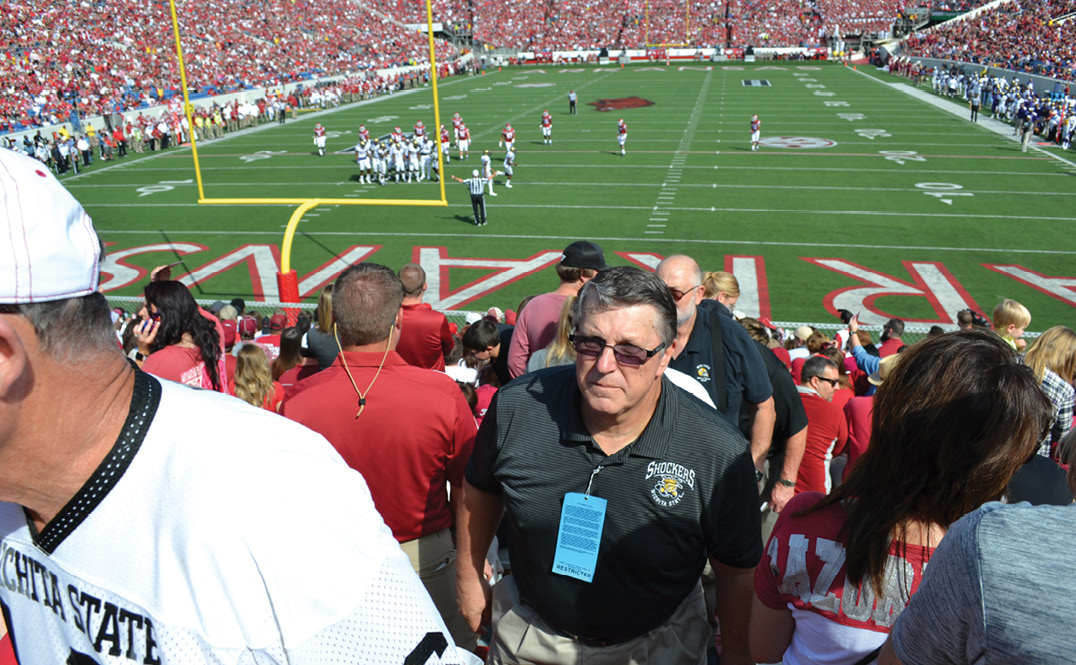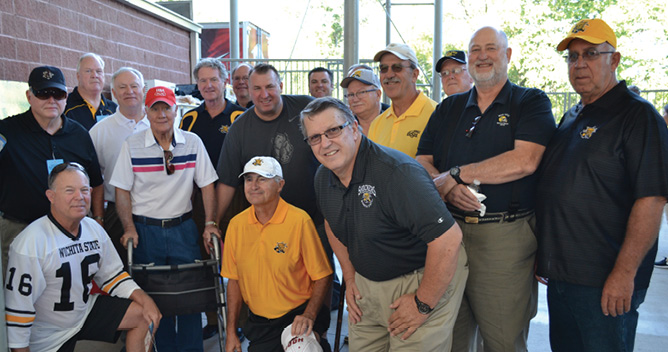
On Oct. 2, 1970, a plane carrying Wichita State Shocker football players, coaches, administrators, boosters and family members crashed in the Rocky Mountains en route to Utah State for a game the following day. Thirty-one people died, including 14 players and head coach Ben Wilson. Nine days later, the remaining members of the team voted 76-1 to continue the season, which later became known as the “Second Season.” On Oct. 24, the Shockers returned to action for the first time since the crash, taking on the 9th-ranked Arkansas Razorbacks at War Memorial Stadium in Little Rock.
One by one, the former football players filed onto the field at War Memorial Stadium in Little Rock, Ark. The visitors from Wichita State walked out first, followed by the Razorbacks of Arkansas.
Maybe the order was simply a product of the athletic tradition that has the home team come out last. But then again, who’s to say it wasn’t part of the respectful hospitality the Razorbacks have shown the Shockers – stretching back 46 years.
You see, the Shocker and Razorback football players weren’t lining up between the lines this particular fall Saturday to settle a score. This moment on Oct. 1, 2016 in War Memorial Stadium was about commemorating one of the most uplifting displays of sportsmanship in college football history – and most of the 1970 players participating in the ceremony hadn’t stepped foot on a football field in more than four decades.
The evening before, Shockers and Razorbacks from the 1970 teams met at a social in North Little Rock as part of a reunion weekend to remember the first football game Wichita State played after the tragic plane crash that took the lives of players, coaches and others just three weeks earlier.
Former Shocker football players, including kicker John Potts ’74 and lineman Kelly Cook remembered that first game of their “Second Season” and how Razorback fans welcomed them in a heartwarming show of support. They spoke about how they will never forget the Arkansas crowd not only giving them a standing ovation before the game, but cheering emphatically every time the Shockers made a first down or a defensive stop.
They remembered how Arkansas used their starters – at least for a few plays at the start of the game – respecting the Shockers’ wishes for the home team to not go easy on them, to treat them like any other opponent. They remembered how the teams stayed on the field – highly unusual for the Frank Broyles-coached Razorbacks – to meet, talk and even pray. And, yes, they recalled how the Shockers lost by a final score of 62-0.
But anyone who thought the final score was the ultimate takeaway from this game simply had not been paying attention. “(Arkansas) embraced the Shockers,” recalled Potts, adding that neither he nor any of his fellow teammates will ever forget that.
“It’s the best of what college athletics should be about,” said Wichita State Athletic Director Darron Boatright.
Chuck Dicus will also never forget that day. He was a captain on the powerful Razorback team that would finish the season 9-2. Wichita State went to Little Rock with a 46-man roster, 39 of them freshmen and sophomores. The 19 freshmen made their college debuts. None of the eight crash survivors suited up.
When Dicus surveyed the Shockers, what he saw was not an overmatched opponent. “When we went to mid-field for the coin toss, and I was face-to-face with some members of the team,” Dicus said, “I remember thinking about the courage it must take to finish the season in honor of their teammates.”
Added Scott Binnion, a running back on that Arkansas team: “Afterwards, in the locker room, there was no real cheering – just smiling and quietly looking at each other and knowing that we were part of something really great.”
Fast forward to the same stadium on Oct. 1, 2016 with scenes of that 1970 first “Second Season” game flickering on the video board: the home crowd of 47,000 was again on their feet and cheering for those courageous Shockers, 15 of whom traveled to Little Rock with their families. Some wore shirts with “Still a Team” stitched on the chests.
Revealing the bond the two sides had forged in the aftermath of tragedy, Potts shared an embrace with Jeff Long, Razorbacks athletic director. Potts and Boatright presented Long and Kevin Crass, chairman of the War Memorial Stadium Commission, with a commemorative plaque in appreciation for the extraordinary support extended all those years ago. Then, as the current Razorbacks team prepared to resume its contest with the Alcorn State Braves, the Shockers made their way off the field and back to their end-zone seats to watch the rest of the game. They had been guests of honor at a tailgating party that morning. Keith Jackson, former NFL tight end from Little Rock, stopped by to extend his welcome, and Arkansas Head Coach Bret Bielema stopped by to talk football with the Shockers for a few minutes.
Before heading back to his seat, an emotional Potts paused in the crowded, narrow concourse of the nearly 70-year-old stadium to take in what he had just experienced. “It was a great day. To be on this stadium field again and to hear the roar of the crowd and their appreciation for what we did that night and their recognition of what we went through – well, it was pretty overwhelming,” he said. “It was a very warm reception.”
After a pause, he added: “Again.”






